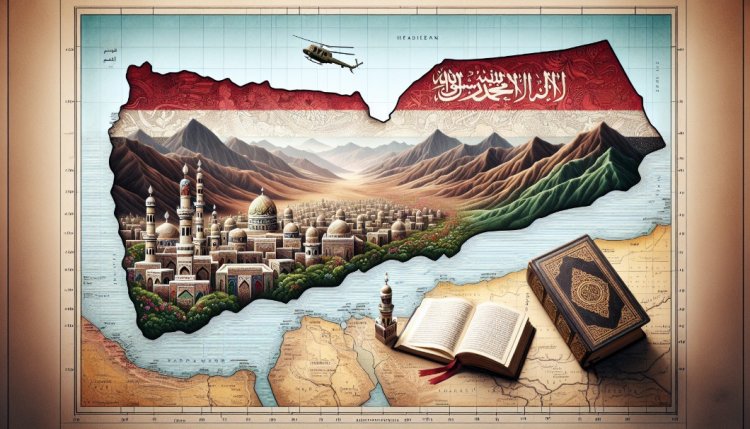The Rise and Reign of the Houthi Movement in Yemen
From marginalized sect to powerful force: Unravel the rise and reign of the Houthi movement in Yemen, its complex origins, political struggles, and the humanitarian crisis in its wake.

Introduction
The Houthi movement, also known as the Houthis, is a rebel army that currently controls over 70% of Yemen. They are engaged in a fierce war against Saudi Arabia and its allies. But how did this group from the mountains in Yemen's far north gain control, and what are their objectives?
-
Hussein Houthi, a religious scholar, led the Houthi movement when it first emerged in Yemen's northwest province in the 1990s. Their aim was to protect and revive Zaydi Islam, a sect of Shiaism that represents 35% of Yemen's population.
-
Zaidis have a long history in Yemen and ruled large parts of the country until the last imam was overthrown in 1962. The Houthi movement believes that government policies have left many Zaidis feeling disenfranchised.
-
Hussein Houthi criticized the influence of US imperialism and Saudi Salafism on Yemen's rulers, particularly President Ali Abdullah Saleh. However, not all Zaidis supported him, and his opponents accused him of pro-Iran links and a desire to reinstate the imamate.
Origins of the Houthi Movement
The Houthi movement, also known as the Houthis, was established in the 1990s in Yemen's northwestern province. Their main objective, under the direction of religious scholar Hussein Houthi, was to safeguard and revive Zaydi Islam, a Shia sect that makes up 35% of Yemen's population.
Zaidis, the followers of Zaydi Islam, have a long and significant history in Yemen. They had ruled large parts of the country until the last imam was overthrown in 1962. The Houthi movement believes that government policies left many Zaidis feeling disenfranchised, leading to their desire to revive and protect their religious beliefs.
The impact of the civil war in North Yemen and the overthrow of the last imam played a crucial role in the formation of the Houthi movement. The civil war broke out in 1962, resulting in the removal of the imamate system and the establishment of a republic. The Houthi movement emerged as a response to the perceived marginalization of Zaidis after the overthrow.
Hussein Houthi criticized the influence of US imperialism and Saudi Salafism on Yemen's rulers, particularly President Ali Abdullah Saleh. His opposition to foreign influences resonated with many Zaidis, who felt a sense of cultural and religious identity with the Houthi movement.
Ideology and Opposition
The Houthi movement has been vocal about their opposition to U.S. imperialism and Saudi Salafism. They criticize the influence of these foreign powers on Yemen's rulers, particularly President Ali Abdullah Saleh. The Houthi's aim is to protect and revive Zaydi Islam, a sect of Shiaism that represents 35% of Yemen's population. They believe that government policies have left many Zaidis feeling disenfranchised.
The imamate, a theocratic system of government presided over by a religious leader who must be a descendant of the Prophet Muhammad, is a system of government that opponents of the Houthi movement have accused them of having pro-Iran ties and wanting to reinstate. These accusations highlight the ideological divide within the Zaidi community, as not all Zaidis support the Houthi movement.
The Houthi movement launched an armed rebellion against President Ali Abdullah Saleh in 2004 after he attempted to arrest Hussein Houthi. Despite Hussein Houthi's death in the same year, the rebellion continued for six years, known as the Sa'da Wars. This armed rebellion showcased the Houthi movement's determination to resist the government and fight for their beliefs.
Expansion and alliances
The Houthi insurgency, which initially emerged in Sadah province, has spread beyond its original stronghold. They played a significant role in the Arab Spring uprising in Yemen in 2011, joining the protest movement against President Ali Abdullah Saleh's 33-year rule. The uprising ultimately forced Saleh to step down, leading to a power vacuum and an economic crisis in the country. The Houthi movement saw an opportunity to expand their control and reemerged, retaking parts of the north.
In a surprising turn of events, the Houthis formed an alliance with their former enemy, Saleh. Together, they stormed the capital city of Sanaa in September 2014, with little resistance from the divided Yemeni army. This alliance allowed the Houthi forces to rapidly expand their control to other territories, including Ib Province to the south and Hodeidah to the west.
The capture of Sanaa marked a significant turning point for the Houthi movement, as they established a new government in the capital. Their rapid expansion led to concerns from neighboring Saudi Arabia, which saw the Houthi's reemergence as a potential threat to their border and Iran's influence in the region.
In response, a coalition with Saudi Arabia and the UAE started a military campaign in March 2015 to drive out the Houthi forces and restore Yemen's government. However, the campaign, known as Operation Decisive Storm, failed to achieve its objectives, and the Houthi grip on power only strengthened.
Saudi intervention and failed campaign
The Saudi-led coalition intervened in Yemen in response to the Houthi movement's rapid expansion and their capture of the capital city of Sanaa in September 2014. Operation Decisive Storm is a military campaign that the coalition, which includes Saudi Arabia and the UAE as leaders, started in March 2015.
The objective of Operation Decisive Storm was to oust the Houthi forces and reinstate Yemen's government. However, despite heavy bombings and airstrikes, the campaign failed to achieve its goals. Instead, the Houthi grip on power only strengthened, and they continued to expand into government-held territories.
Efforts to reach a peaceful resolution to the conflict through UN-led peace talks, including ceasefires and prisoner exchanges, were attempted but ultimately failed. The ongoing conflict has resulted in a dire humanitarian situation, with Yemen facing a desperate famine and the displacement of millions of people.
Houthi's Resistance and Strengthened Grip on Power
The Houthi movement has displayed remarkable resilience and determination in the face of the Saudi-led coalition's military campaign. They have successfully resisted attempts to remove them from power and have continued to expand their territory.
Despite facing heavy bombings and airstrikes, the Houthi forces have showcased their military capabilities through reprisal attacks on Saudi Arabia. They have also been accused of detaining and torturing opposition figures and recruiting child soldiers.
Failed Attempts at Peace Talks
Multiple attempts at peace talks between the Houthi movement and the Saudi-led coalition have been made to reach a ceasefire and find a political solution to the conflict. However, these attempts have been unsuccessful in ending the ongoing hostilities.
Both sides have been accused of committing crimes against humanity, including the targeting of civilian areas, hospitals, and schools. The humanitarian situation in Yemen has reached crisis levels, with widespread famine and the urgent need for humanitarian aid.
In December 2017, former Yemeni President Ali Abdullah Saleh broke ties with the Houthi rebels and expressed willingness to engage in dialogue with the Saudi-led coalition. However, a Houthi sniper killed him two days later, escalating tensions and ruling out the possibility of a peaceful resolution.
Humanitarian Crisis and Accusations
The ongoing conflict in Yemen has led to a worsening humanitarian situation, with devastating consequences for the country's population.
The accusations of crimes against humanity have been made by both sides involved in the conflict. Human rights organizations have accused the Houthi movement and the Saudi-led coalition of targeting civilian areas, hospitals, and schools.
The Houthi forces have been accused of detaining and torturing opposition figures, as well as recruiting child soldiers. These actions have raised concerns about their respect for human rights and international law.
The impact of the conflict on the already impoverished population of Yemen has been devastating. The country is facing a desperate famine, with millions of people in urgent need of humanitarian aid. The destruction of infrastructure and the disruption of essential services have further exacerbated the crisis.
The targeting of civilian areas, hospitals, and schools has had a severe impact on the civilian population, causing significant loss of life and displacement. The lack of access to medical care and education has further deepened the suffering of the Yemeni people.
Efforts to reach a peaceful resolution through UN-led peace talks have been unsuccessful, prolonging the suffering of the Yemeni people and exacerbating the humanitarian crisis. The international community must continue to push for a resolution to the conflict and provide much-needed humanitarian assistance to alleviate the suffering of the Yemeni people.
Death of Ali Abdullah Saleh and Continued Expansion
In December 2017, former Yemeni President Ali Abdullah Saleh broke ties with the Houthi rebels and expressed willingness to engage in dialogue with the Saudi-led coalition. This move was seen as a potential turning point in the conflict, as Saleh had previously been aligned with the Houthi movement. However, a Houthi sniper killed Saleh just two days later, ruling out the possibility of a peaceful resolution.
Ali Abdullah Saleh's assassination highlighted the ongoing tensions and violence within Yemen. The Houthi movement, accused of detaining and torturing opposition figures, showed their willingness to eliminate any dissenting voices. This act further escalated tensions and solidified the Houthi movement's grip on power.
Despite the death of Saleh, the Houthi movement continued to expand its control and launch reprisal attacks on Saudi Arabia. These attacks showcased the Houthi forces' military capabilities and their ability to strike beyond Yemen's borders. The Houthi movement's continued expansion and reprisal attacks have raised concerns about regional stability and Iran's influence in the region.
Accusations of Human Rights Abuses
The Houthi movement has faced accusations of human rights abuses, including detaining and torturing journalists, academics, students, and minorities. These actions have raised concerns about their respect for human rights and international law. The targeting of civilian areas, hospitals, and schools by both the Houthi forces and the Saudi-led coalition has had severe consequences for the civilian population, resulting in significant loss of life and displacement.
Continued Expansion and Reprisal Attacks
Despite facing heavy bombings and airstrikes, the Houthi forces have displayed remarkable resilience and determination, successfully resisting attempts to remove them from power. Their continued expansion and reprisal attacks into Saudi Arabia have further solidified their grip on power and showcased their military capabilities.
The Houthi movement's expansion and ongoing conflict have led to a dire humanitarian crisis in Yemen. The country is facing a desperate famine, with millions of people in urgent need of humanitarian aid. The destruction of infrastructure and disruption of essential services have further exacerbated the crisis, leaving the Yemeni people in a state of immense suffering.
Efforts to reach a peaceful resolution through UN-led peace talks have been unsuccessful, prolonging the suffering of the Yemeni people and exacerbating the humanitarian crisis. The international community must continue to push for a resolution to the conflict and provide much-needed humanitarian assistance to alleviate the suffering of the Yemeni people.
International Involvement and Implications
The conflict in Yemen between the Houthi movement and Saudi Arabia has attracted international attention and involvement. Here are some key points to consider:
Drone Strikes on Saudi Arabia's Aramco Oil Facilities
Drone strikes on Saudi Arabia's Aramco oil facilities in September 2019 resulted in a significant disruption of the world's oil supply. The Houthi movement claimed responsibility for the attack, considering it a victory against their adversary.
Houthi's Claim of Victory and Iran's Denial
The Houthi movement celebrated the drone strikes as a success against Saudi Arabia. However, both Saudi Arabia and the United States accused Iran of using the Houthis as a cover to launch attacks on the Gulf. Iran denied any involvement in the attack.
Accusations of Iran Funding and Arming the Rebels
Throughout the war, there have been accusations that Iran has been providing financial support and weapons to the Houthi rebels. These accusations have further heightened tensions in the region and raised concerns about Iran's influence.
Potential Consequences if the Houthis Win the War
If the Houthi movement ultimately wins the war, it could have significant implications for the region. It would solidify their control over Yemen and potentially strengthen Iran's influence in the area. This outcome could also lead to further instability and a potential threat to neighboring countries, including Saudi Arabia.
Overall, the international involvement in the Yemen conflict, especially regarding the drone strikes on Saudi Arabia's Aramco oil facilities, highlights the complexity and potential consequences of the ongoing war. The accusations of Iran's involvement and the potential outcomes if the Houthis emerge victorious add to the already volatile situation in the region.



 admin
admin 










